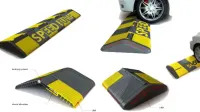Are these the world's worst speed bumps?
If you ask a lot of driving enthusiasts, they'll tell you that speed bumps are annoying across the board. Most community organizations, however, would argue the opposite. And as with so many other things, the most effective and mutually tolerable path lies somewhere in the middle. But that middle ground is a big area. Some speed bumps are more tolerable – or more effective – than others, but striking a balance between safely slo





